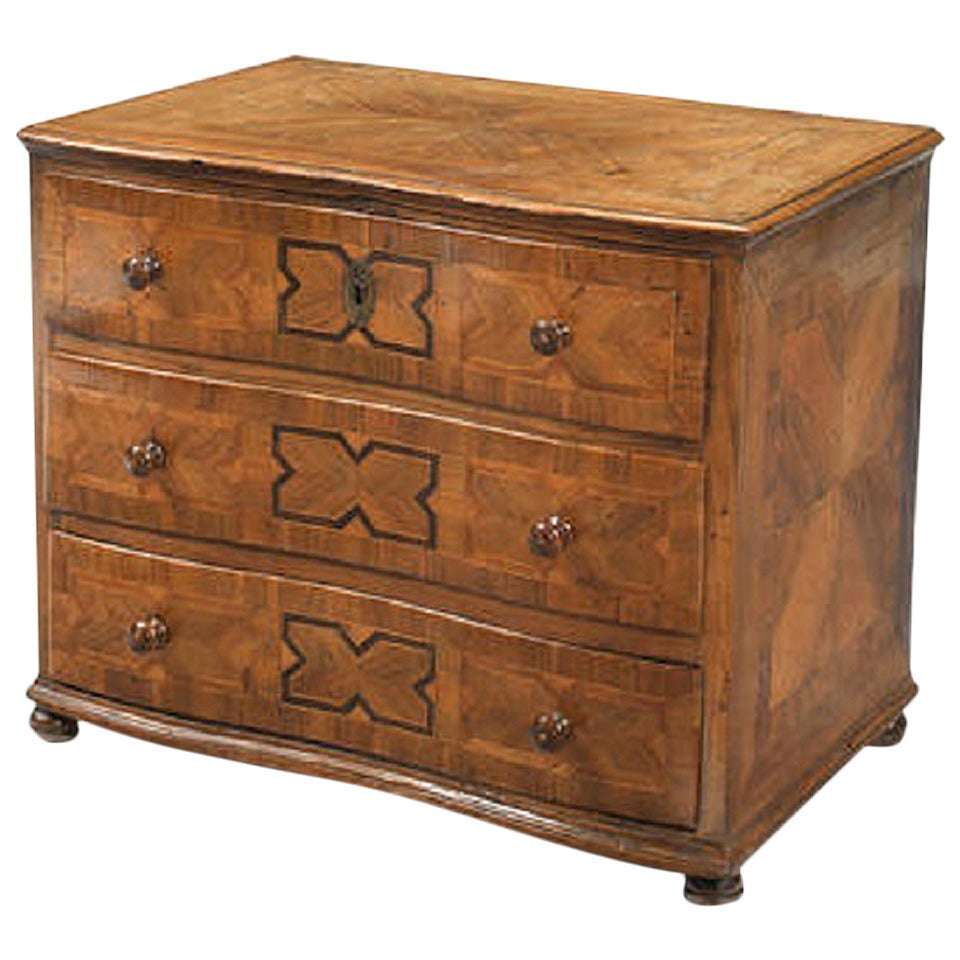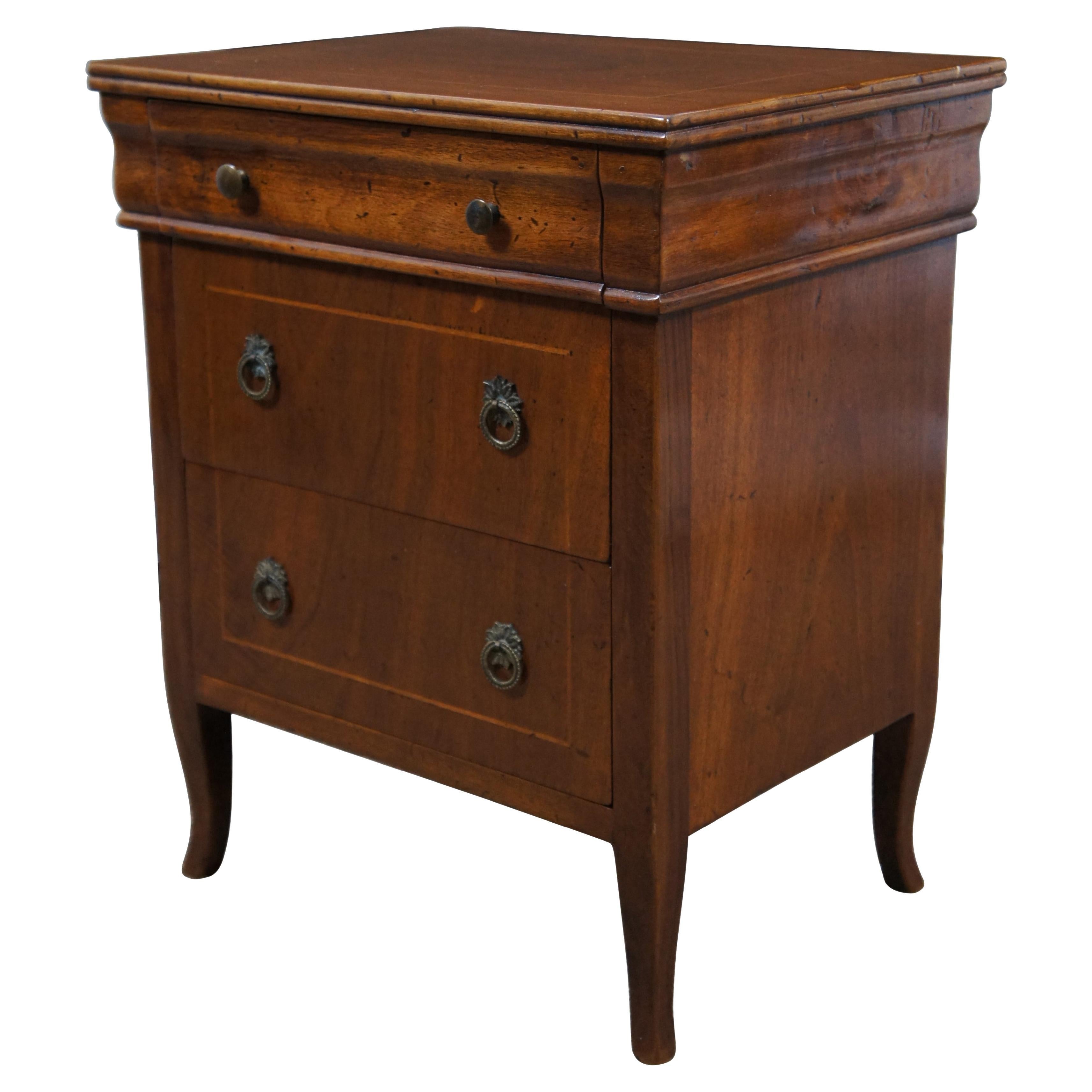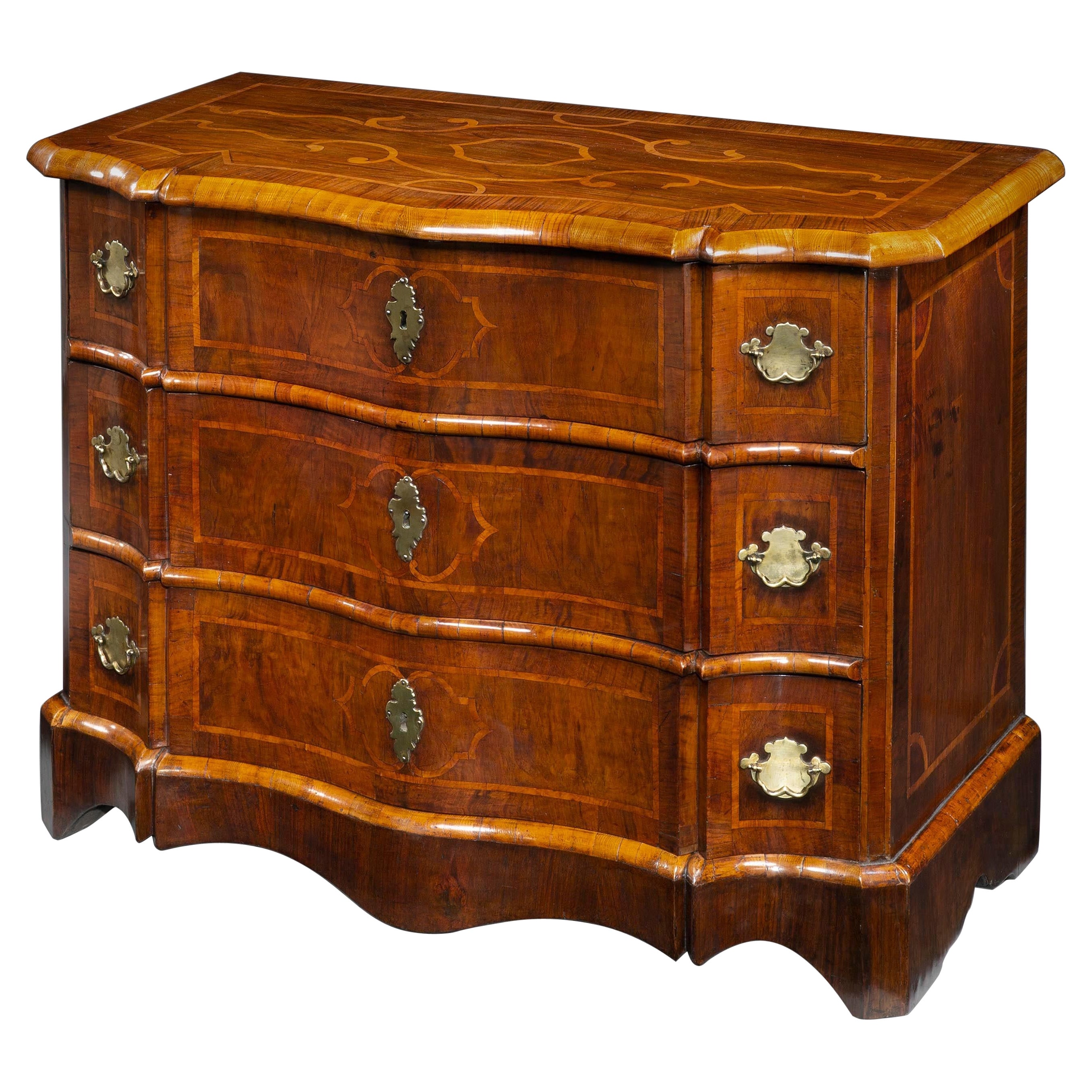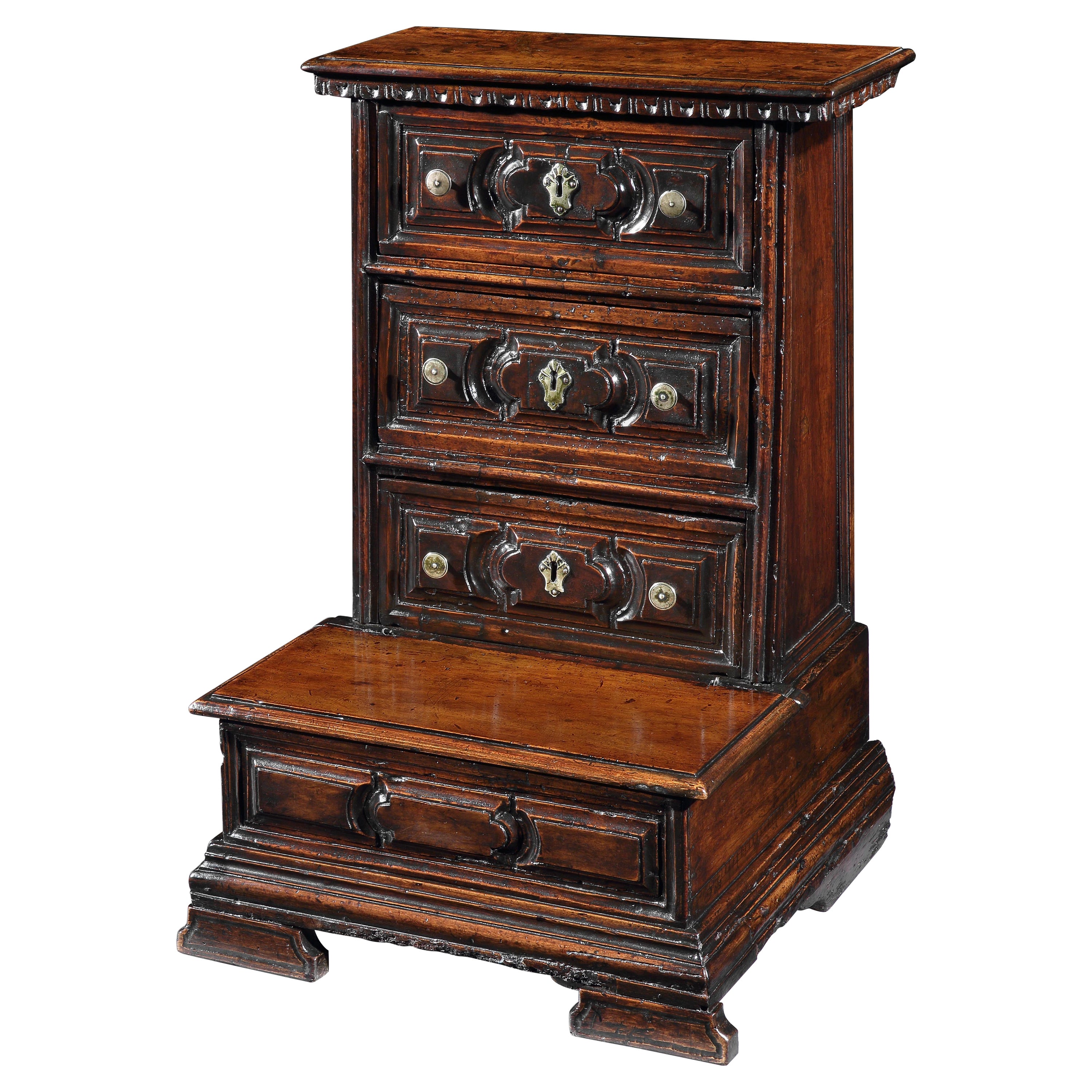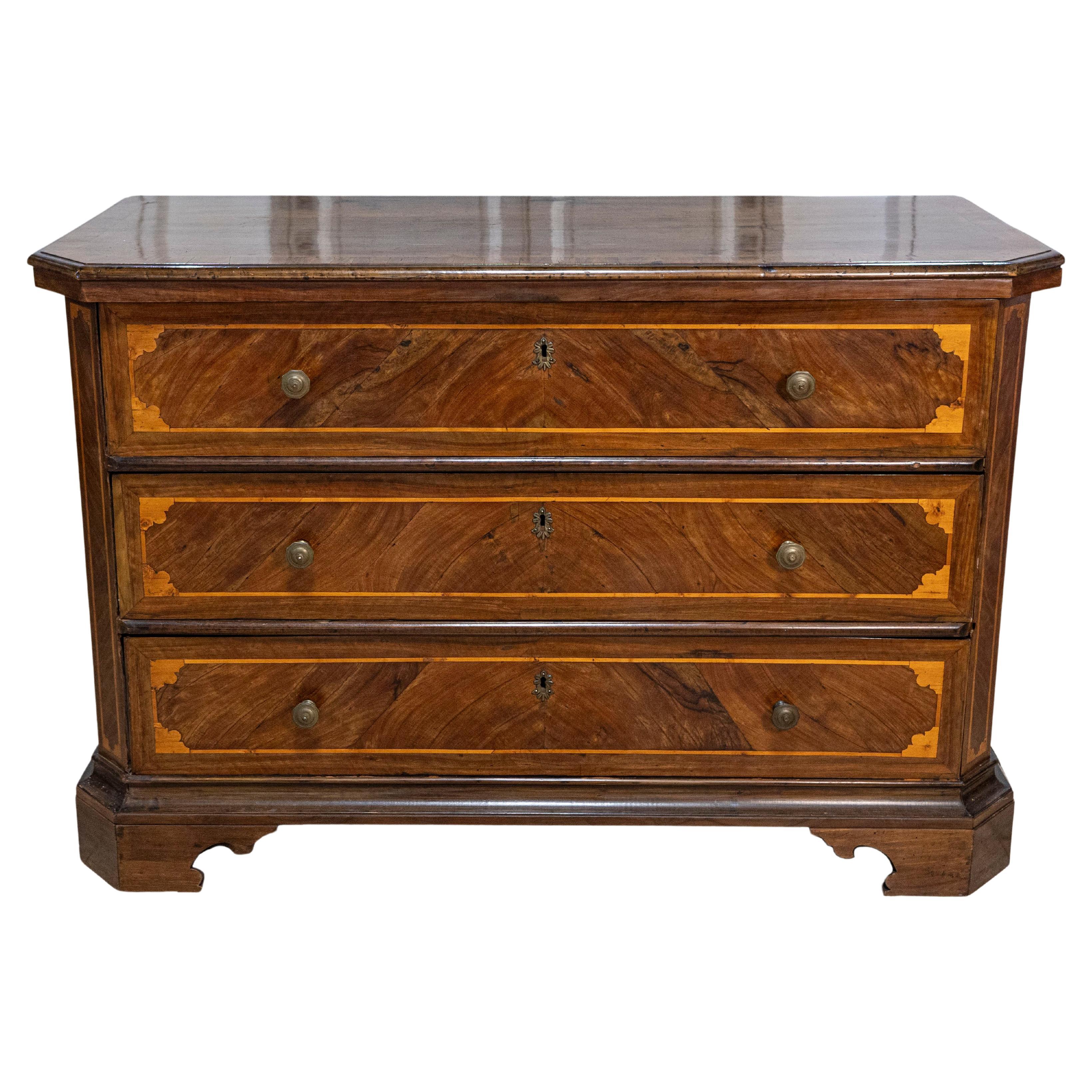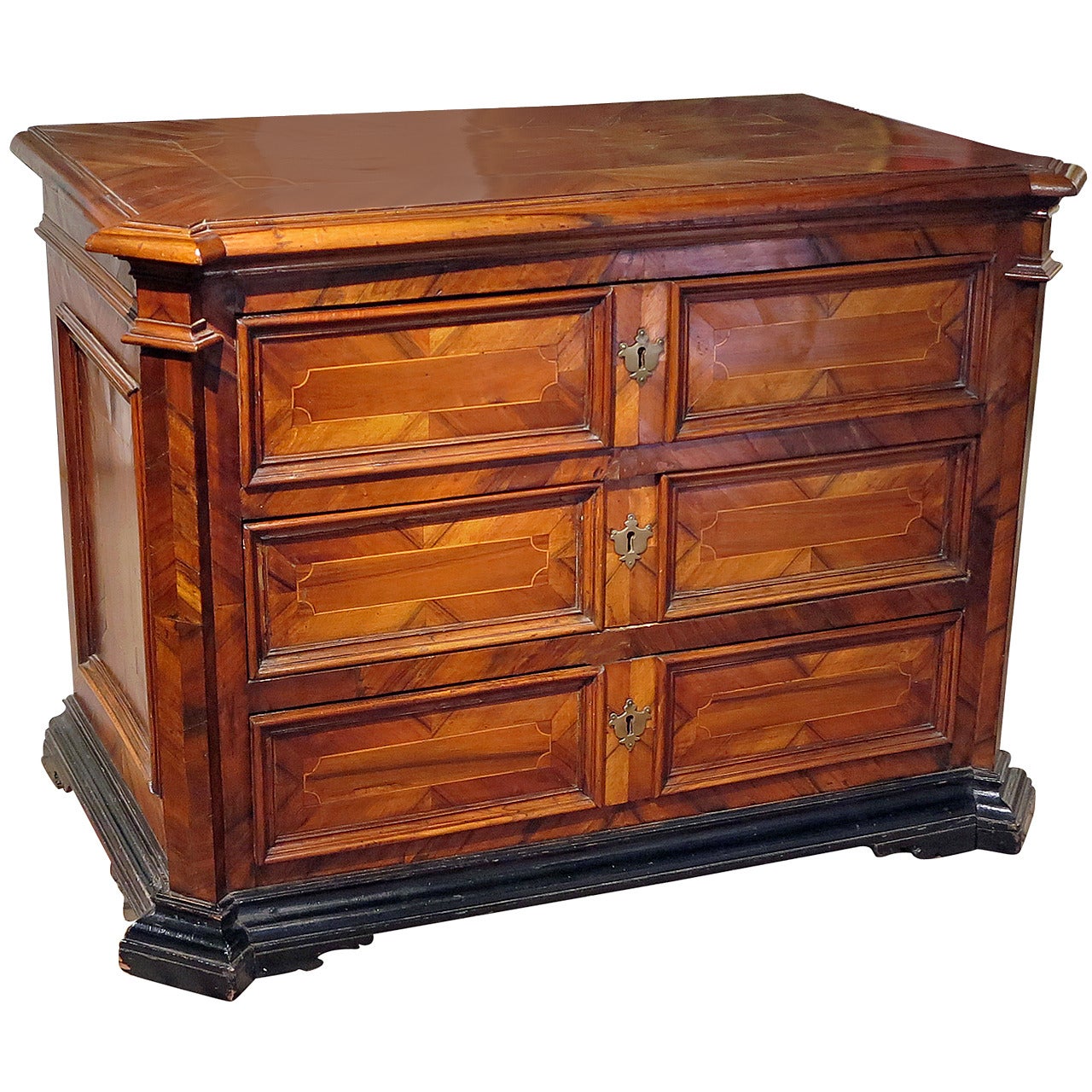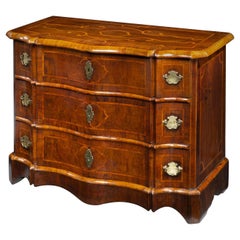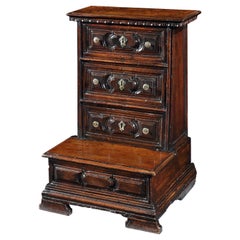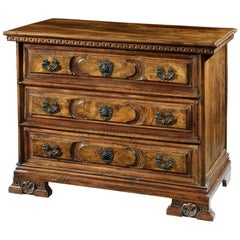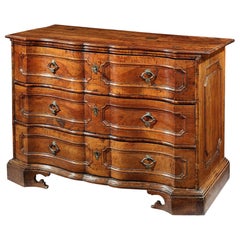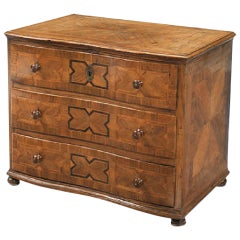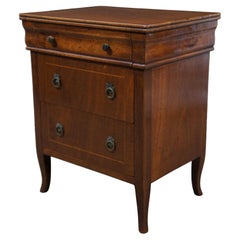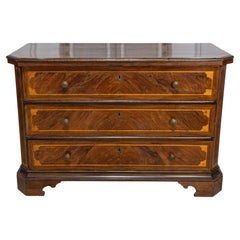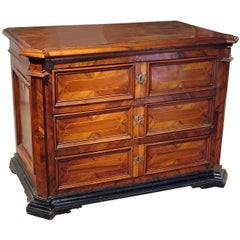Items Similar to Commode Minature Long Walnut Maltese Cross Ebonised Fruitwoo
Want more images or videos?
Request additional images or videos from the seller
1 of 17
Commode Minature Long Walnut Maltese Cross Ebonised Fruitwoo
$6,703.68
£5,000
€5,758.23
CA$9,404.26
A$10,261.76
CHF 5,309.11
MX$122,761.50
NOK 67,066.75
SEK 62,974.63
DKK 43,003.77
About the Item
An exceptionally rare, museum quality Maltese, Neoclassical walnut chest of drawers with ebonised & fruitwood inlaid maltese cross on the top and drawer fronts
Maltese furniture of this period is exceptional reflecting the status and affluence of the island.
Given the size of the island relatively little Maltese furniture was made in comparison to Europe & American mainland.
Minature furniture is rare made either as a model or an apprentice's piece so it is extremely rare to find a minature piece from Malta bearing the Maltese cross.
This minature commode is highly original with beautiful proportions, ornamentation and patination.
The 'H' shaped top with a large centered inlaid Maltese Cross and a border of stringing. The breakfront fitted with three drawers each with stringing and inlaid six point stars centrally positioned behind the wooden knobs. The uprights with two continuous vertical bands of stringing ebonised and fruitwood from the top to the bottom of the drawers in walnut to match the front of the chest and then reverting to ebonising and fruitwood down the feet. Terminating in tapering feet. The panelled sides with a repeat of the double banding on the uprights and rectangular borders within the panels. The oak lined drawers with the original 18th century blue paper lining.
Measures: length 27 cm 10 1/2", height 24 cm 9 1/2", depth 20 cm 8".
Maltese Cross:
The Maltese cross is a symbol that is most commonly associated with the Knights of Malta (also known as the Knights Hospitallers), who ruled the Maltese islands between 1530 and 1798. The Maltese cross is nowadays widely used and associated with Malta featuring on the Maltese Euro coins. The shape of the Maltese cross is star-like with four V-shaped arms that are joined together at the tips. It’s frequently used either in black and white or red and white and is symmetrical both vertically as well as horizontally. The Maltese cross formally adopted by the Knights Hospitallers of St. John in 1126, stylistically owes its origins to the crosses used in the crusades, when it was identified as the symbol of the “Christian warrior”: Its eight points denote the eight obligations or aspirations of the knights, namely “to live in truth, have faith, repent one’s sins, give proof of humility, love justice, be merciful, be sincere and wholehearted, and to endure persecution”. With time, the eight points also came to represent the eight langues (or “tongues”, but in effect national groupings) of the noblemen who were admitted to the famed order, namely those of Auvergne, Provence, France, Aragon, Castille and Portugal, Italy, Baviere (Germany), and England (with Scotland and Ireland). As part of its present-day teachings, the cross represents eight beatitudes (or ‘blessings’). A good first aider in service of the Order of St. John is Observant, Tactful, Resourceful, Dextrous, Explicit, Discriminating, Persevering and Sympathetic.
- Dimensions:Height: 9.45 in (24 cm)Width: 10.63 in (27 cm)Depth: 7.88 in (20 cm)
- Style:Neoclassical (Of the Period)
- Materials and Techniques:
- Place of Origin:
- Period:
- Date of Manufacture:circa 1780
- Condition:Wear consistent with age and use.
- Seller Location:BUNGAY, GB
- Reference Number:1stDibs: LU3867332199612
About the Seller
5.0
Vetted Professional Seller
Every seller passes strict standards for authenticity and reliability
Established in 1985
1stDibs seller since 2018
103 sales on 1stDibs
Typical response time: 8 hours
- ShippingRetrieving quote...Shipping from: BUNGAY, United Kingdom
- Return Policy
More From This Seller
View AllCommode Italian Venetian Baroque Burr Walnut Geometric Inlay Serpentine Front
Located in BUNGAY, SUFFOLK
The serpentine front on this magnificent commode is sophisticated and gives it gravitas. The undulating form is a masterpiece of carpentry.
The carpenter has used different woods fi...
Category
Antique 1720s Italian Baroque Commodes and Chests of Drawers
Materials
Walnut, Burl
Chest of Drawers Table Kneeler Inginocciatoio Walnut Venice Rule Carved Baroque
Located in BUNGAY, SUFFOLK
Venetian, baroque, small, walnut, Inginocchiatoio, table, chest or kneeler with a rule along the right lower end of the right side.
- In wonderful original condition with original...
Category
Antique 1680s Italian Baroque Commodes and Chests of Drawers
Materials
Walnut
Commode, 18th Century, Italian, Venetian, Walnut, Small, Original Brassware
Located in BUNGAY, SUFFOLK
This Classic 18th century model is a rare, small size with a rich color and lustrous patina. From a private collection, Semenzato, Venezia.
Single plank top with solid moulded edge. The frieze with a band of gadrooned carving at the top. Below three drawers mouled with fine figuring original brass handles, escutcheon and locks only the top lock working. The pine drawers are lined with a block printed...
Category
Antique Early 18th Century Italian Baroque Commodes and Chests of Drawers
Materials
Walnut
Commode, Early 18th Century, Italian, Venetian, Baroque, Walnut, Serpentine Front
Located in BUNGAY, SUFFOLK
The serpentine front on this magnificent commode is sophisticated and gives it gravitas. It has a rich colour and lustrous patina and has come from a private collection, Semenzato Ve...
Category
Antique Early 18th Century Italian Baroque Commodes and Chests of Drawers
Materials
Walnut
Commode Cassetone Chest of Drawers Italian Brescia Lombardy Walnut Carved Front
Located in BUNGAY, SUFFOLK
This rare cassettone oozes charm and character. The carved decoration is particular to Brescia in Lombardy and the knobs are a rare feature carved as flowerheads to the petals behind...
Category
Antique Late 17th Century Italian Baroque Commodes and Chests of Drawers
Materials
Walnut
Cassettone Bureau-Chest Bambocci 16century Italian Renaissance Walnut Lombardy
Located in BUNGAY, SUFFOLK
AN EXCEPTIONAL MUSEUM QUALITY, ITALIAN, RENAISANCE WALNUT CASSETTONE WITH A FITTED BUREAU IN THE UPPER PART & EXCEPTIONAL BAMBOCCI CARVING, LOMBARDY
- This exceptionally rare, museum quality, piece of early furniture was conceived and crafted as an artwork of the finest quality of its time. Throughout time it has been a luxurious, statement piece which has protected it, and fortunately it has survived in virtually, original condition.
- This magnificent cassettone exudes the character and quality of the finest, late-Renaissance furniture.
Northern Italian Renaissance furniture often had the sides, legs or angles, 'a Bambocci', incorporating carved figures which were considered unique sculptures in their own right.
- The putti on this cassettone are beautifully carved and of sculptural quality. Each angel has one arm raised to heaven, a poignant touch.
- The lion’s paw feet are a classical feature and make a great statement.
- This cassettone was conceived to have visual impact through the quality of the carving, as well as being very practical with the writing compartment fitted in the top part.
- It has survived in very original condition with a few small repairs and losses, and the colour and patina are warm and lustrous.
- This cassettone is illustrated Illustrated in C. Alberici, Il Mobile Lombardo, Milan, 1969, p. 45, one of the seminal works on Lombardy furniture, and has been in two renowned collections.
The hinged top in two sections faced with a solid moulded edge. The front part has a fall front and opens to reveal a writing compartment. The fall front retains its original lock and is concealed with a false drawer which is above three drawers. All with moulded panels, escutcheons and retaining the original iron handles. The front ends have exceptional, bambocci, carved putti raising their arms to heaven above trailing foliage. Standing on magnificent lion's-head carved feet. The sides are panelled. Exceptional original colour and patina.
Literature : Illustrated in C. Alberici, Il Mobile Lombardo, Milan, 1969, p. 45. A Gonzalez-Palacois, Il mobile in Liguria, Genova, 1996 illustrates related pieces
Measures: Length 147 ½ cm. 58 in, height 104 cm. 41 in, depth 75 cm. 29½ in,
Provenance: Coll. Private Azzate The Collection of Sandro and Lidia Orsi, Ca’ Mera, Varese. Regarded as one of the most beautiful homes in Lombardy, Ca’ Mera, the country house of Sandro and Lidia Orsi was filled with beautiful objects from many different epochs. A renowned antiquarian from Milan, over his lifetime Sandro and his wife Lidia revived the Renaissance and Baroque character of the house and instilled their own unique vision into the interiors, which culminated with the creation of a Kunst – or Wunderkammer. “I have never seen such an example of poetical taste”, Sir John Pope...
Category
Antique 16th Century Italian Renaissance Commodes and Chests of Drawers
Materials
Walnut
You May Also Like
South German Walnut, Maple and Ebony Banded Serpentine Apprentice's Commode
Located in Lymington, Hampshire
A South German 18th century walnut, maple and ebony banded serpentine Apprentice's commode of small size, with quarter veneering and fruitw...
Category
Antique Late 18th Century German Commodes and Chests of Drawers
Materials
Ebony, Maple, Walnut
Italian Louis Philippe Style Walnut Miniature Chest Commode Nightstand
Located in Dayton, OH
Vintage Louis Philippe style miniature chest of drawers / commode made of walnut with a string inlay of satinwood on the top and front. The case, finished on all sides, holds a shall...
Category
Late 20th Century Italian Louis Philippe Commodes and Chests of Drawers
Materials
Brass
$1,330 Sale Price
30% Off
Italian 1690s Walnut and Ash Three-Drawer Commode with Inlaid Décor
Located in Atlanta, GA
An Italian walnut and ash three-drawer commode from circa 1690 with inlaid décor, canted side posts and ogee bracket feet. This exquisite Italian walnut and ash three-drawer commode ...
Category
Antique Late 17th Century Italian Baroque Commodes and Chests of Drawers
Materials
Wood, Ash, Walnut
Fine Italian Baroque Walnut Commode, 17th Century
Located in Sheffield, MA
A fine Italian Baroque.
Walnut commode.
17th century.
Measures: Height 37 ½ in. Width 52 ½ in. Depth 27 in.
Provenance:
Private Collection, Boston, MA.
Le Trianon...
Category
Antique Late 17th Century Italian Baroque Commodes and Chests of Drawers
Materials
Walnut
Important Portuguese Commode 18th Century in Carved Brazilian Rosewood
Located in Madrid, ES
Important Portuguese Commode
18th Century
in carved Brazilian rosewood, with 2 drawers
Wavy body, protruding carved pilasters, decorated with vegetal rolls.
Sits on curved feet endin...
Category
Antique 18th Century Portuguese Baroque Commodes and Chests of Drawers
Materials
Rosewood
Northern European Neoclassical Mahogany Commode with Ebony Inlay circa 1790
Located in Milford, NH
A nice example of a Neoclassical mahogany commode in a three over two configuration, with molded edge top with notched front surmounting a case with ebony inlaid drawer fronts, brass...
Category
Antique 1790s European Neoclassical Commodes and Chests of Drawers
Materials
Brass
More Ways To Browse
Malta Cross
Maltese Cross
The Crusades
Antique Maltese
18th Century Neoclassical Commode
18th Century American Chest Of Drawers
9 Drawer Chest Of Drawers
Antique Maltese Cross
Apprentice Piece
Long Chest Of Drawers
Ebonised Chest Of Drawers
Ebonised Commode
Antique Maltese Furniture
Knights Of Malta
18th Century Maltese Furniture
Maltese Cross Furniture
Swedish Elm
Rosewood Marquetry
